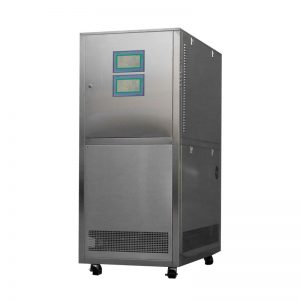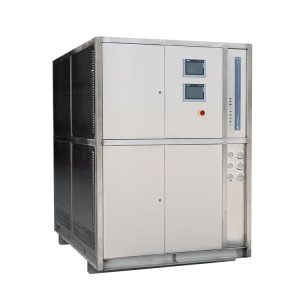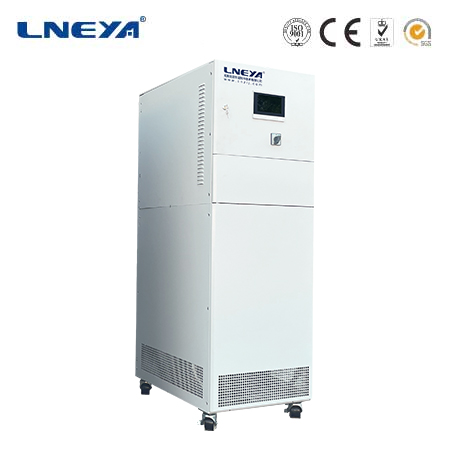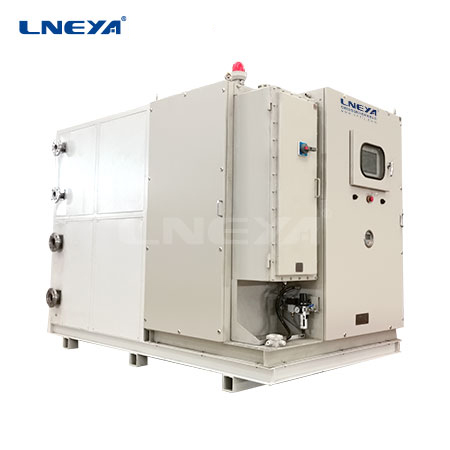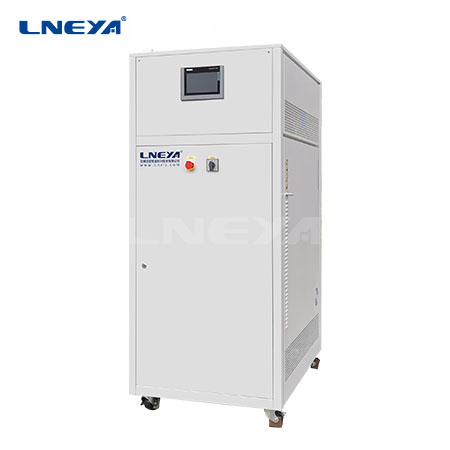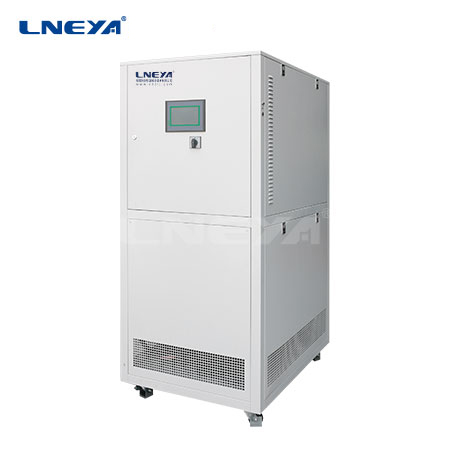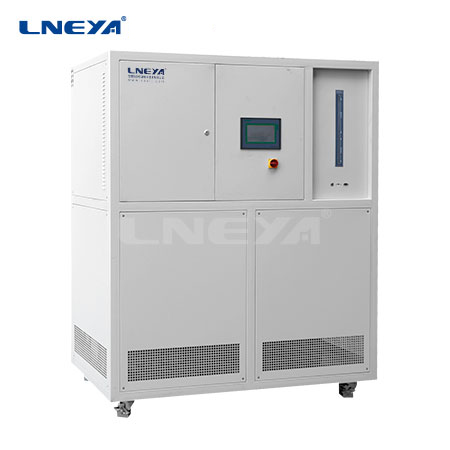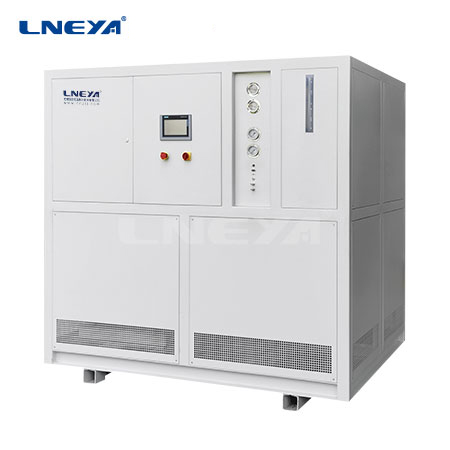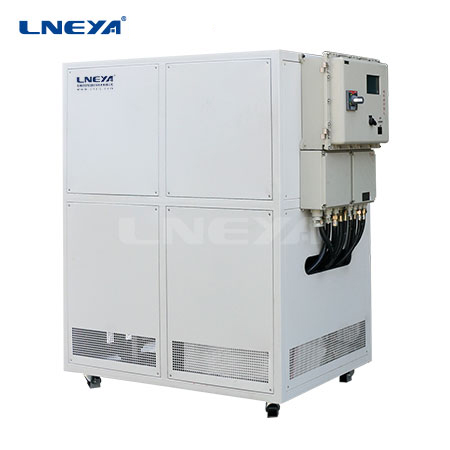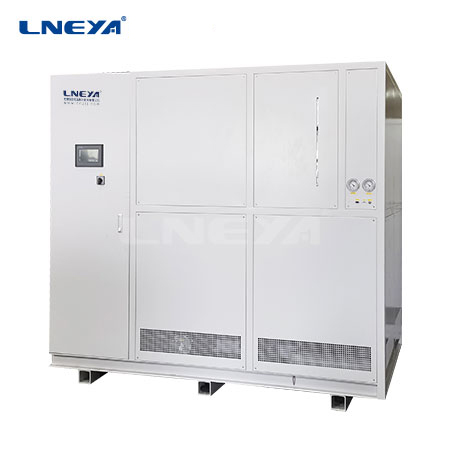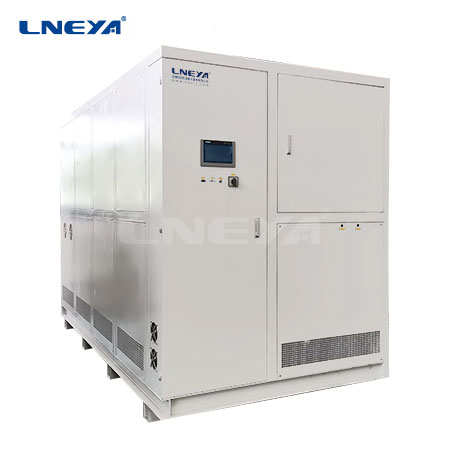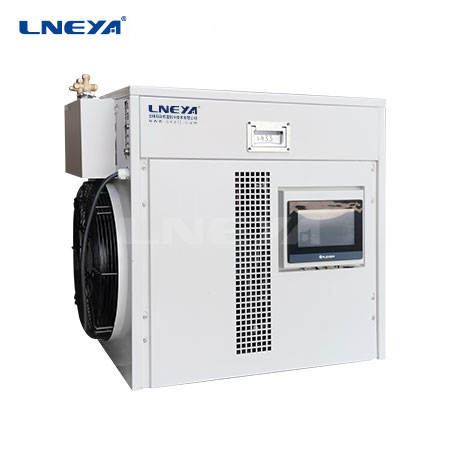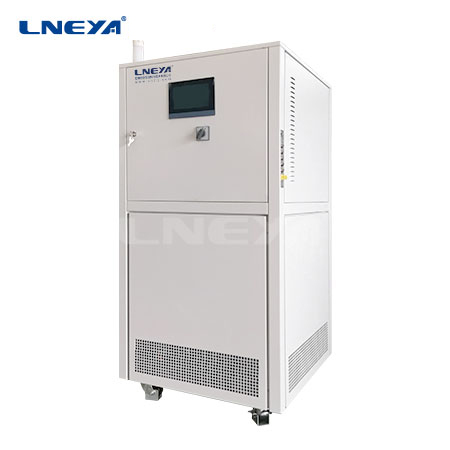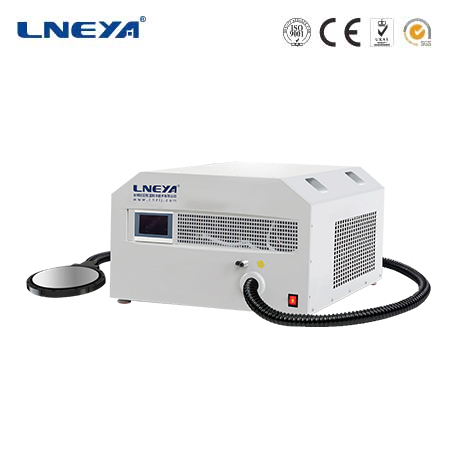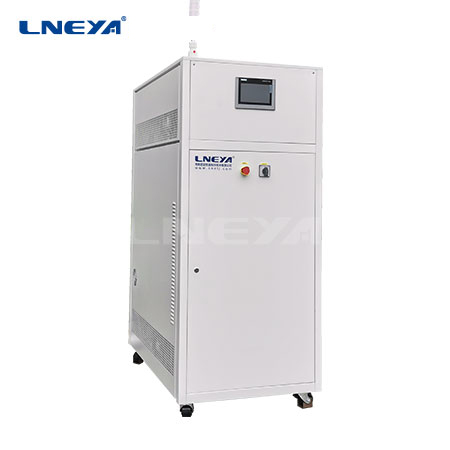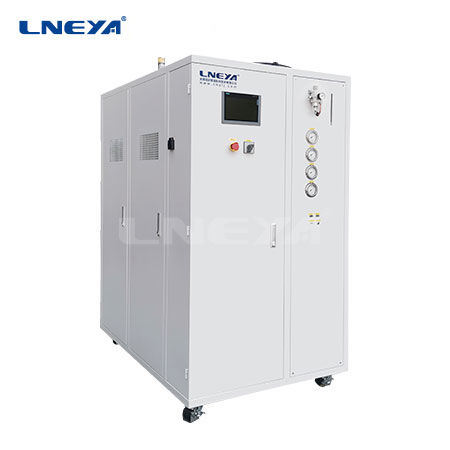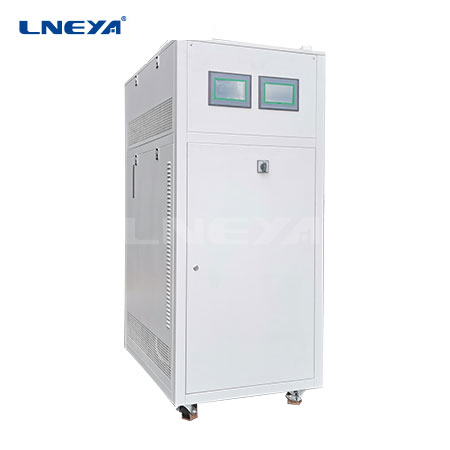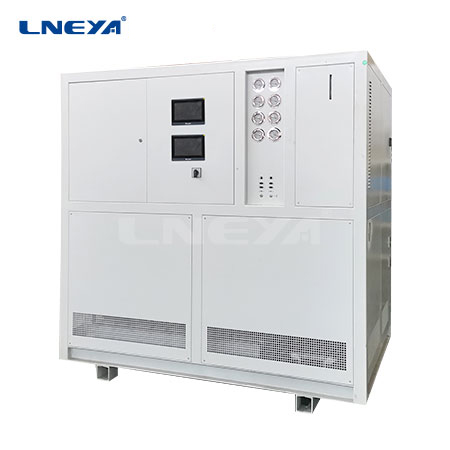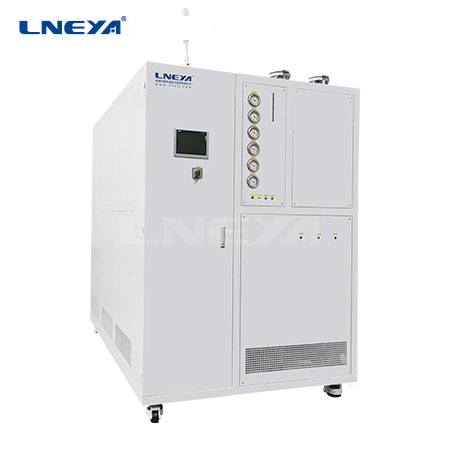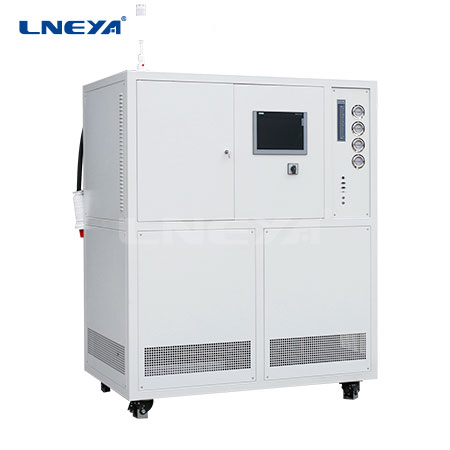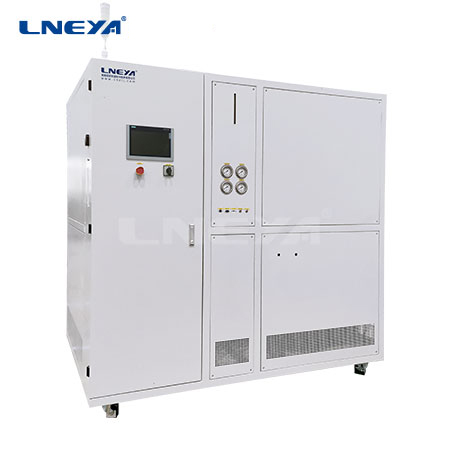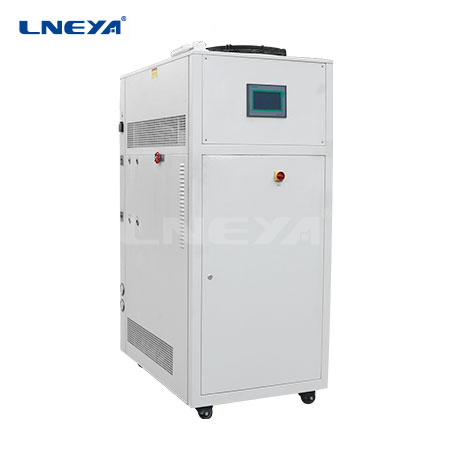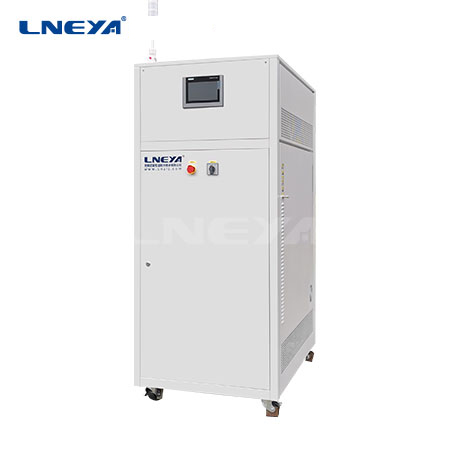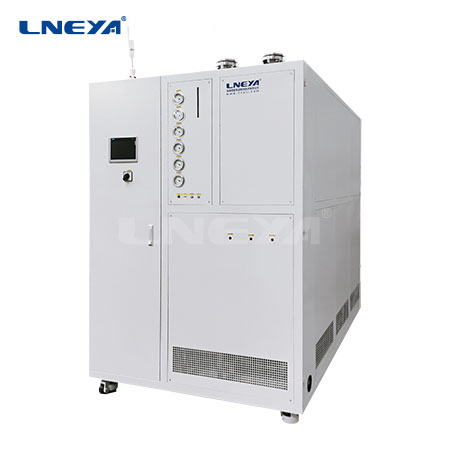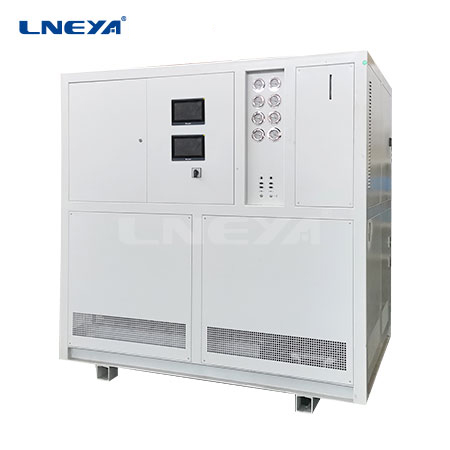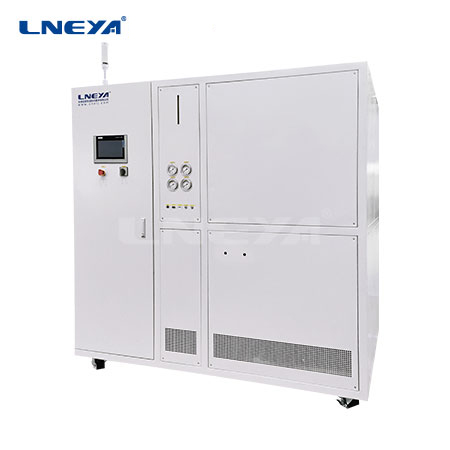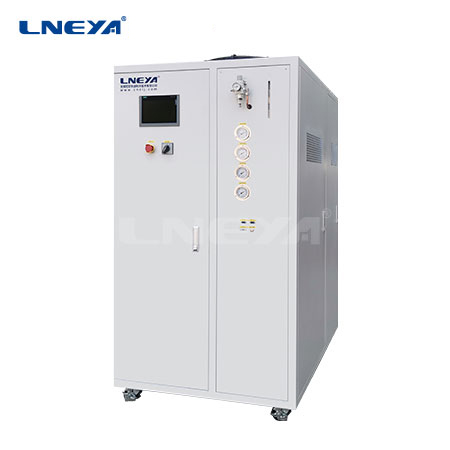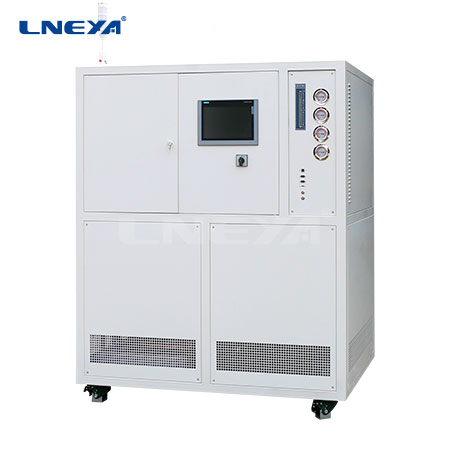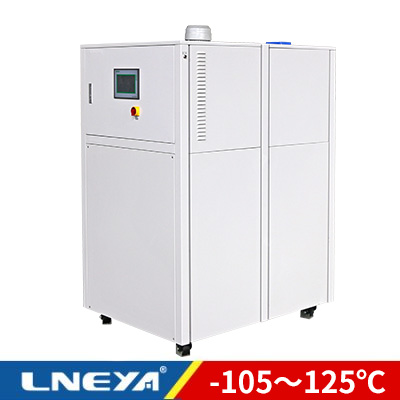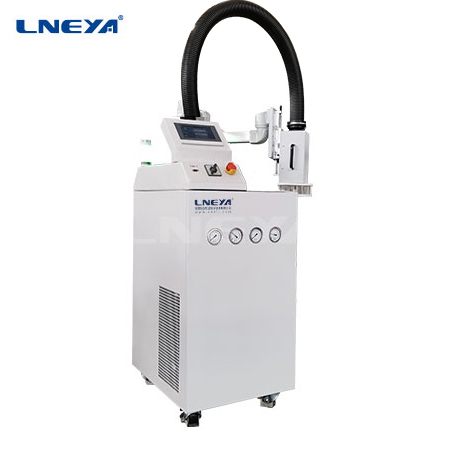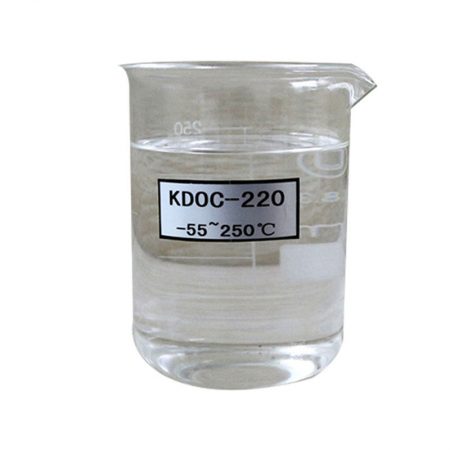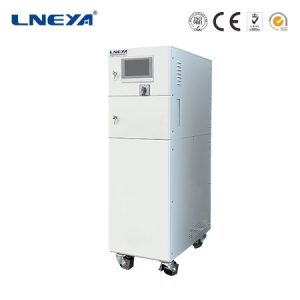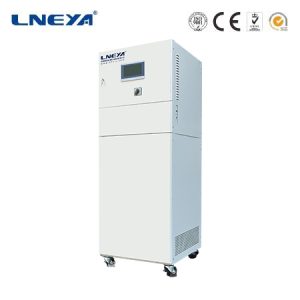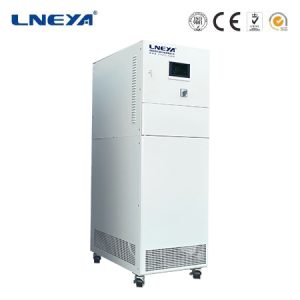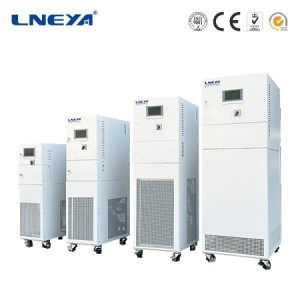Reactor Heating and Cooling Thermostats
Kontaktieren Sie uns noch heute für die perfekte Lösung zur Temperaturkontrolle
Reactor heating and cooling thermostats adopt a fully sealed design without a bath. It is dedicated to constant temperature control of external loads. It adopts a sealed design. It will not produce oil mist and pungent odors to volatilize into the environment at high temperatures, and will not absorb impurities in the ambient air at low temperatures. and moisture, only the heat-conducting medium participates in the circulation, and the temperature of the expansion tank is always kept at a low temperature, which avoids many problems such as deterioration of the circulating medium and unfriendly environment caused by air entering the circulation system.
Mainly used in: dynamic constant temperature control of hot and cold sources such as high-pressure reactors, pilot production stainless steel reactors, double-layer glass reactors, jacketed reactors, microchannel reactors, reaction devices, combined chemistry, and low-temperature distillation in the pharmaceutical industry , distillation, extraction and other equipment, this series can provide a temperature control range of -80°C ~ +250°C, and can be upgraded to a high temperature of 300°C. It is especially suitable for rapid exothermic and endothermic chemical reaction tests.
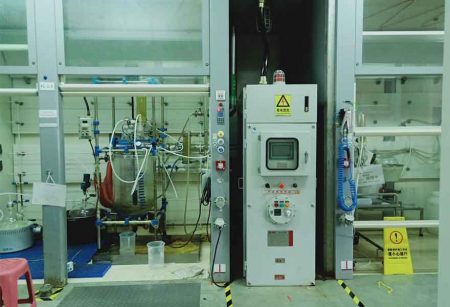
In the chemical industry, pharmaceutical industry, food processing and other fields, reactors are important equipment for realizing material reaction, purification and separation. However, traditional reactors have certain limitations in temperature control and operational flexibility. In order to solve these problems, reactor heating and cooling thermostats came into being.
Reactor heating and cooling thermostats are comprehensive equipment that integrates temperature control, material reaction and separation functions. It mainly consists of the main body of the reactor, high and low temperature control system, material transportation system and exhaust gas emission system. The equipment is characterized by its high-precision temperature control and automation of the operation process, making the reaction process more stable and controllable.
The working principle of reactor heating and cooling thermostats is mainly realized through the high and low temperature control system. The system includes heating devices, cooling devices and temperature sensors. The heating device is responsible for heating the contents of the reaction kettle to the required reaction temperature, while the cooling device is responsible for maintaining the temperature within the reaction kettle within a certain range during the reaction process. The temperature sensor monitors the temperature in the reactor in real time and provides feedback information to the control system.
In terms of material transportation, reactor heating and cooling thermostats adopt an automated operating system. Through pipes and valves, the input of raw materials, the output of reactants and the emission of waste gas are realized. The entire operation process does not require manual intervention, reducing operational risks and improving work efficiency.

The exhaust system is an important part of reactor heating and cooling thermostats. The system includes an exhaust gas collection device, an exhaust gas treatment device and an exhaust pipe. The waste gas generated during the reaction will be collected in time and discharged through the exhaust pipe after treatment, ensuring the safety of the working environment.
Reactor heating and cooling thermostats have a wide range of applications in actual production. For example, in the pharmaceutical industry, this equipment can be used in processes such as synthesizing drugs and extracting active ingredients; in the food processing industry, reactor heating and cooling thermostats can be used in food fermentation, extraction and other operations. In addition, this equipment also plays an important role in the chemical industry, new material research and development and other fields.
Advantages of reactor heating and cooling thermostats
1. A magnetically coupled high-temperature circulation pump is used to eliminate the risk of system leakage, with good sealing and high flow rate, ensuring that the equipment can exchange heat for the external system faster.
2. Only the medium in the pipeline participates in cyclic temperature control, which reduces the amount of heat transfer medium involved and improves the response speed of the system’s high and low temperature control.
3. Equipped with a user-friendly 7-inch true-color LCD touch screen, a good human-computer interaction interface, and intuitive display of local machine parameters and external temperature control parameters. Smart touch, easy to operate.
4. Design multiple sets of communication data interfaces to easily access various communication networks.
5. Reasonable layout: Frequent operations are in front of the equipment, pipeline connections are at the rear of the equipment, and the data interface is set on the side of the equipment.
6. The standard configuration is air-cooling, which requires no external water source and is easy to install and operate; the water-cooling type has stable heat dissipation efficiency and is not affected by the ambient temperature.
7. Considering the needs of chemical customers, isolation and explosion-proof and positive pressure explosion-proof models can be customized according to the customer’s equipment placement area.
8. A single device can have multiple outputs, with multiple reactors and reactor loads. Each channel can achieve independent temperature control, saving space.
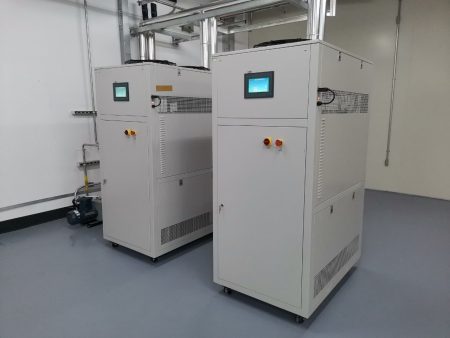
Development of reactor heating and cooling thermostats
1. Intelligentization: With the continuous development of artificial intelligence technology, reactor heating and cooling thermostats will achieve more intelligent operations and improve production efficiency and quality.
2. Energy saving and environmental protection: The energy-saving design of the equipment and the application of high-tech environmental protection technology will help reduce energy consumption and environmental pollution.
3. Large-scale: In order to meet the needs of large-scale production, the scale of reactor heating and cooling thermostats will be further expanded to increase single output.
4. High pressure and high temperature: In order to explore more possible chemical reactions and substance synthesis methods, reactor heating and cooling thermostats will develop towards high pressure and high temperature to promote the progress of scientific research.
As a multi-functional equipment, reactor heating and cooling thermostats have broad application prospects in the chemical industry, pharmaceutical industry, food processing and other fields. With the continuous advancement of science and technology, it is believed that this kind of equipment will play a more important role in the future and make greater contributions to promoting industrial development and technological progress.
Wir bieten die Entwicklung und Herstellung kompletter Temperaturkontrollsysteme an. Von Standardmodellen bis zu kompletten kundenspezifischen Produkten bis hin zu 900 Tonnen. Wir haben uns auf den Kundenservice spezialisiert und sind bestrebt, jedem Kunden zu helfen, das optimale Temperaturkontrollsystem für seinen spezifischen Bedarf zu finden.
Wir bieten maßgeschneiderte Lösungen, die nicht dem Standard entsprechen. Es sind sowohl einzelne Kühlaggregate als auch kombinierte Kühl- und Heizaggregate erhältlich.
E-Mail: info@lneya.com WeChat ID: +8615251628237 WhatsApp: +86 17851209193

Kühl- und Heizsysteme (Serie SUNDI)
Temperaturregelbereich: -120°C bis +350°C
Kühl- und Heizungsthermostate, die in verschiedenen Industriezweigen weit verbreitet sind.
| Temperaturbereich | Serie -10 ~ +150°C | Serie -25 ~ +200°C | Serie -25 ~ +300°C | Serie -45 ~ +250°C | Serie -45 ~ +300°C | Serie -60 ~ +250°C | Serie -60 ~ +300°C | Serie -70 ~ +250°C | Serie -80 ~ +250°C | Serie -90 ~ +250°C | Serie -100 ~ +100°C | ||
| Kühlleistung | 1,5 ~ 15kW | 1 ~ 200kW | 1 ~ 200kW | 0,45 ~ 200kW | 0,9 ~ 25kW | 0,25 ~ 60kW | 0,75 ~ 25kW | 0,4 ~ 15kW | 0,3 ~ 80kW | 0,2 ~ 80kW | 0,45 ~ 80kW | ||
| Hinweis: Jeder Temperaturbereich von -150℃ ~ +350℃ und jede Kühlleistung kann angepasst werden | |||||||||||||

Kühl- und Heizsysteme (WTD-Serie)
(Mikrokanal / Röhrenreaktoren spezialisiert)
Temperaturregelbereich: -70°C bis +300°C
Spezielles Design für Mikrokanäle (geringe Flüssigkeitsspeicherkapazität, starke Wärmeaustauschkapazität, Zirkulationssystem mit hohem Druckabfall)
| Temperaturbereich | -70°C ~ +300°C | -45°C ~ +250°C | -70°C ~ +200°C | ||||||
| Kühlleistung | 1.1 ~ 7.5kW | 1.5 ~ 5.5kW | 11 ~ 50kW | ||||||
| Hinweis: Jeder Temperaturbereich von -150℃ ~ +350℃ und jede Kühlleistung kann angepasst werden | |||||||||

Umwälzpumpen für Kühlung und Heizung
Temperaturregelbereich: -45°C bis +250°C
| Temperaturbereich | Serie -25°C ~ +200°C | Serie -45°C ~ +250°C | |||||||
| Kühlleistung | 1 ~ 15kW | 0,25 ~ 15kW | |||||||
| Hinweis: Jeder Temperaturbereich von -150℃ ~ +350℃ und jede Kühlleistung kann angepasst werden | |||||||||

Heizungsumwälzpumpen
Temperaturregelbereich: +50°C bis +300°C
Hinweis: Die UC-Serie kann die Temperatur des Wärmeträgermediums regeln. Die UST-Serie kann nicht nur die Temperatur des Wärmeträgermediums, sondern auch die Temperatur des Reaktionsmaterials regeln.
| Temperaturbereich | +50°C ~ +170°C (UC-Serie) | +50°C ~ +300°C (UC-Serie) | +50°C ~ +300°C (UST-Serie) | ||||||
| Heizleistung | 5,5 ~ 15kW | 3,5 ~ 130kW | 3,5 ~ 95kW | ||||||
| Hinweis: Jeder Temperaturbereich von -150℃ ~ +350℃ und jede Kühlleistung kann angepasst werden | |||||||||

TES-Reihe
Temperaturregelbereich: -85°C bis +250°C
| Temperaturbereich | Serie -45°C ~ +250°C | Serie -85°C ~ +200°C | Serie -60°C ~ +200°C | ||||||
| Kühlleistung | 0,3 ~ 25kW | 0,25 ~ 25kW | 3 ~ 60kW | ||||||
| Hinweis: Jeder Temperaturbereich von -150℃ ~ +350℃ und jede Kühlleistung kann angepasst werden | |||||||||

LTS-Serie (fluorierte Flüssigkeit)
Temperaturregelbereich: -80°C bis +80°C
| Temperaturbereich | -20°C ~ +80°C Reihe | Serie -45°C ~ +80°C | Serie -60°C ~ +80°C | Serie -80°C ~ +80°C | |||||
| Durchflusskontrolle | 7 ~ 45 L/min | 7 ~ 45 L/min | 7 ~ 45 L/min | 7 ~ 45 L/min | |||||
| Hinweis: Jeder Temperaturbereich von -150℃ ~ +350℃ und jede Kühlleistung kann angepasst werden | |||||||||

TCU Multireaktoren Temperaturkontrollsystem
Temperaturregelbereich: -120°C bis +250°C
| Temperaturbereich | Serie -45°C ~ +250°C | -120°C ~ +250°C Reihe | Kundenspezifisches Temperaturkontrollsystem | RT+10°C ~ +135°C | |||||
| Heizleistung | 25 ~ 80kW | 25 ~ 80kW | Benutzerdefiniert | 25 ~ 300kW | |||||
| Hinweis: Jeder Temperaturbereich von -150℃ ~ +350℃ und jede Kühlleistung kann angepasst werden | |||||||||

Rückkühler / Umwälzkühler
Die Kältemaschine kann in verschiedenen Industrien und Labors eingesetzt werden und unterstützt kundenspezifische Designs.
| Temperaturbereich | Serie -25°C ~ +30°C | -45°C ~ +30°C Reihe | Serie -60°C ~ -20°C | Serie -80°C ~ -20°C | Serie -120°C ~ -70°C | ||||
| Kühlleistung | 0,8 ~ 30kW | 0,75 ~ 12kW | 0,4 ~ 6kW | 0,2 ~ 6kW | 0,3 ~ 5kW | ||||
| Hinweis: Jeder Temperaturbereich von -150℃ ~ +350℃ und jede Kühlleistung kann angepasst werden | |||||||||
 Kaltwassersätze / Kleinkaltwassersätze
Kaltwassersätze / Kleinkaltwassersätze
Die Kältemaschine kann in verschiedenen Industrien und Labors eingesetzt werden und unterstützt kundenspezifische Designs.
| Temperaturbereich | -18°C ~ +30°C | +5°C ~ +35°C Reihe | |||||||
| Kühlleistung | 0,35 ~ 0,9kW | 1,8 ~ 50kW | |||||||
| Hinweis: Jeder Temperaturbereich von -150℃ ~ +350℃ und jede Kühlleistung kann angepasst werden | |||||||||

Niedertemperatur-Kühlgeräte
Wir haben uns auf die Herstellung von Niedertemperaturkältemaschinen mit einem Temperaturregelbereich von bis zu -150°C spezialisiert, die den Kühlbedarf verschiedener Branchen decken.
| Temperaturbereich | Serie -25°C ~ -5°C | Serie -45°C ~ -10°C | Serie -60°C ~ -10°C | Serie -80°C ~ -30°C | Serie -110°C ~ -50°C | Serie -150°C ~ -110°C | |||
| Kühlleistung | 12 ~ 360kW | 6 ~ 180kW | 6 ~ 180kW | 4 ~ 180kW | 2 ~ 120kW | 2,5 ~ 11kW | |||
| Hinweis: Jeder Temperaturbereich von -150℃ ~ +350℃ und jede Kühlleistung kann angepasst werden | |||||||||

Hochtemperatur-Kühlgeräte
Die Kältemaschine kann in verschiedenen Industrien und Labors eingesetzt werden und unterstützt kundenspezifische Designs.
| Temperaturbereich | +5°C ~ +40°C | -25°C ~ +40°C | -45°C ~ +40°C | -80°C ~ +80°C | -100°C ~ +80°C | ||||
| Kühlleistung | 6 ~ 40kW | 2 ~ 15kW | 1 ~ 8kW | 0,6 ~ 3kW | 1,5 ~ 3kW | ||||
| Hinweis: Jeder Temperaturbereich von -150℃ ~ +350℃ und jede Kühlleistung kann angepasst werden | |||||||||
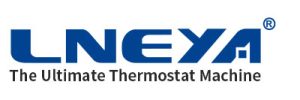 LNEYA
LNEYA
 简体中文
简体中文










